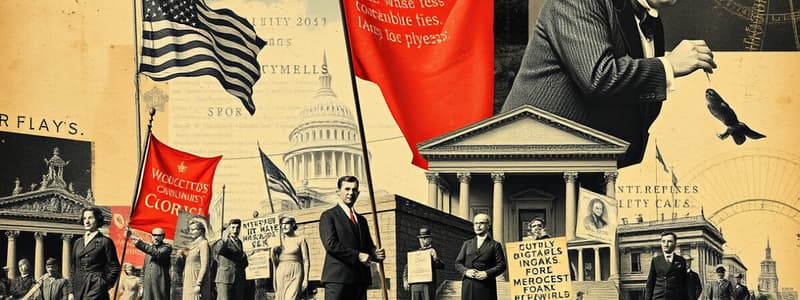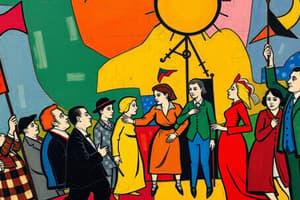Podcast
Questions and Answers
What was the main purpose of Progressives?
What was the main purpose of Progressives?
- To limit democracy
- To use government as an agency of human welfare (correct)
- To support inefficiency
- To promote monopoly and corruption
What does Laissez-faire mean?
What does Laissez-faire mean?
Let alone
Who charged headlong into the Standard Oil Company with his book 'Wealth Against Commonwealth'?
Who charged headlong into the Standard Oil Company with his book 'Wealth Against Commonwealth'?
Henry Demarest Lloyd
What was Jacob Riis known for?
What was Jacob Riis known for?
What did Jane Addams build in Chicago?
What did Jane Addams build in Chicago?
What did the Triangle Shirtwaist Company tragedy lead to?
What did the Triangle Shirtwaist Company tragedy lead to?
The 17th Amendment established direct election of U.S. senators.
The 17th Amendment established direct election of U.S. senators.
What was the aim of the Meat Inspection Act of 1906?
What was the aim of the Meat Inspection Act of 1906?
Who was the founder of the Women's Christian Temperance Union?
Who was the founder of the Women's Christian Temperance Union?
What did the Elkins Act address?
What did the Elkins Act address?
The initiative allows voters to directly propose legislation.
The initiative allows voters to directly propose legislation.
What was the primary focus of the 'Square Deal'?
What was the primary focus of the 'Square Deal'?
The __________ Act of 1906 was designed to prevent adulteration and mislabeling of foods.
The __________ Act of 1906 was designed to prevent adulteration and mislabeling of foods.
What is Trustbusting?
What is Trustbusting?
Match the following historical figures with their contributions:
Match the following historical figures with their contributions:
Flashcards are hidden until you start studying
Study Notes
Progressivism
- Progressives sought to use government to address issues such as monopoly, corruption, and social injustice.
- Aimed to expand democracy to cure the ills of American democracy.
Economic Policies
- Laissez-faire: A hands-off approach allowing capitalists to operate with minimal government interference.
- Trustbusting emerged as a progressive goal to dismantle monopolistic trusts.
Notable Figures
- Henry Demarest Lloyd: Authored "Wealth Against Commonwealth" exposing Standard Oil in 1894.
- Jacob Riis: His book "How the Other Half Lives" revealed the harsh realities of New York slums, influencing social reform.
- Theodore Dreiser: Novelist who criticized profiteering in "The Financier" and "The Titan."
- Jane Addams: Founded Hull House in Chicago, a pivotal site for social reform and women's support.
Muckraking Journals
- McClure’s magazine was significant for exposing corruption, leading to the term "muckrakers."
- Lincoln Steffens exposed the corrupt ties between big business and local governments in "The Shame of the Cities."
- Ida M. Tarbell wrote about the malpractices of the Standard Oil Company, stemming from personal family woes.
Progressive Electoral Reforms
- Direct Primary Elections allowed voters to select candidates directly, bypassing party elites.
- Initiative and Referendum empowered citizens to propose and approve legislation directly.
- Recall provided a mechanism for voters to remove elected officials from office.
Legislative Changes
- The Australian Ballot served to limit corruption by ensuring secret voting.
- The 17th Amendment established direct election of U.S. senators, enhancing democratic participation.
Women's Suffrage Movement
- Suffragists advocated for women's voting rights, reflecting broader social changes in gender equality.
Iconic Progressive Leaders
- Robert M. La Follette championed the Wisconsin Idea, a policy connecting university expertise with social legislation.
- Hiram W. Johnson fought against corporate control in California politics.
Labor and Social Reforms
- The Triangle Shirtwaist Factory fire in 1911 highlighted dangerous labor conditions, leading to stronger regulations.
- Muller v. Oregon supported labor laws protecting women, despite limiting job opportunities for them.
Food and Safety Regulations
- Upton Sinclair's "The Jungle" prompted the Meat Inspection Act and Pure Food and Drug Act, enforcing federal regulations on food safety.
Conservation Efforts
- Gifford Pinchot promoted conservation as a balance between use and preservation of resources.
- The Newlands Act funded irrigation projects in the West, transforming arid land into productive areas.
Presidential Administration
- William Howard Taft, Roosevelt's chosen successor, faced criticism from progressives for his policies, particularly the Payne-Aldrich Tariff.
- Dollar Diplomacy under Taft focused on using economic influence for political gain in foreign affairs.
Key Judicial Decisions
- Lochner v. New York invalidated labor laws aimed at protecting bakery workers.
- The Rule of Reason came out of antitrust cases, limiting government intervention only to "unreasonable" trade restrictions.
Cultural Movements
- The Boy Scouts, founded in 1910, aimed at instilling values in youth through outdoor activities.
- The Sierra Club emerged as a key player in the conservationist movement, committed to preserving America's natural landscapes.
Key Challenges of the Era
- Joe Cannon, House Speaker, showcased internal conflicts within the Republican Party during Roosevelt’s presidency, criticizing his consolidation of power.
Studying That Suits You
Use AI to generate personalized quizzes and flashcards to suit your learning preferences.




